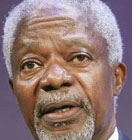Annan calls for faster reform in Kenya
 Nairobi - Former United Nations secretary general Kofi Annan Wednesday called on Kenya's leaders to quicken the pace of reform or face a repeat of the violence that followed the disputed presidential elections in December 2007.
Nairobi - Former United Nations secretary general Kofi Annan Wednesday called on Kenya's leaders to quicken the pace of reform or face a repeat of the violence that followed the disputed presidential elections in December 2007.
Annan brokered the power-sharing deal that brought an end to months of tribal violence that killed at least 1,300 people and displaced hundreds of thousands.
"Kenya cannot afford a recurrence of the crisis and violence that engulfed it after the 2007 election," Annan told journalists at the end of a three-day trip to the East African nation. "But that is a serious risk if tangible reform is not achieved."
Some reports have warned that rival tribes are arming themselves with automatic weapons in preparation for the 2012 presidential elections.
Annan met President Mwai Kibaki and Prime Minister Raila Odinga - the two men whose election battle sparked the violence - and other leaders, including those from civil society, during his visit.
He warned that Kenyans were suffering a "crisis of confidence" in their leaders.
"Kenyans, who are normally patient people, are beginning to doubt if their leaders can deliver," he said.
The Kenyan government has been accused of delaying reforms to the electoral system, the judiciary and land policy, as well as failing to address huge economic disparity.
These reforms were recommended by two independent commissions set up to probe the violence.
Annan said that although work had begun in some of the areas, the pace of reform "must be accelerated."
Kenyan leaders have also failed to prosecute senior politicians and businessmen accused of instigating the violence, as recommended in an independent inquiry into the violence.
Annan has handed over an envelope containing the names of suspects to the International Criminal Court (ICC). The names have not been made public.
ICC Chief Prosecutor Luis Moreno-Ocampo said last week that his court would try the worst offenders and leave the others up to a special tribunal.
However, attempts to set up a tribunal have floundered in parliament.
Annan said a local tribunal was needed, but that the ICC would also have to step in and try top-level suspects. dpa